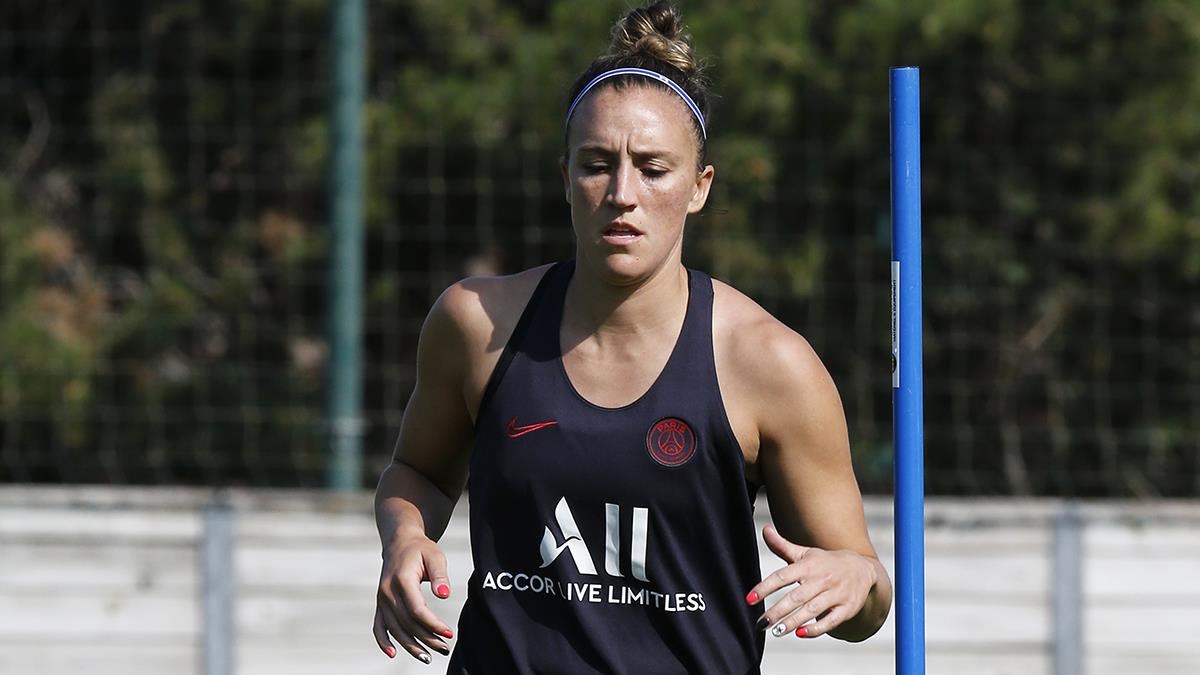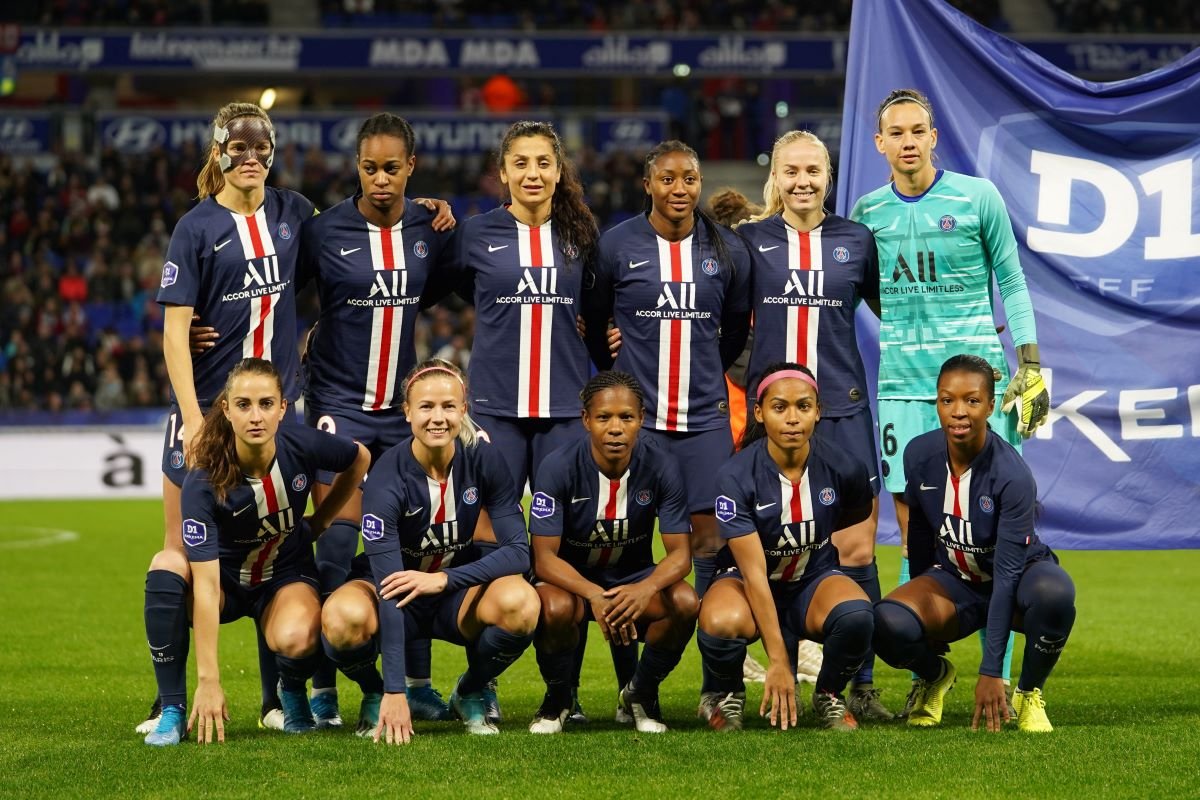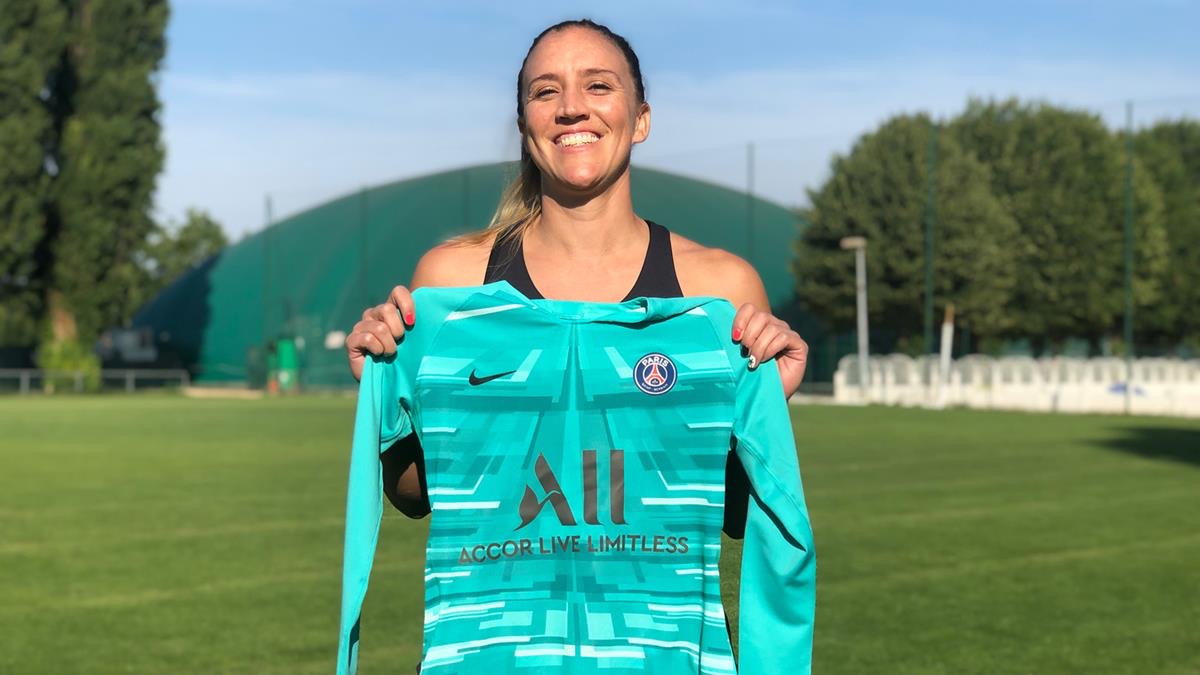
Arianna Criscione is nothing short of a force of nature, with Paris Saint-Germain’s reserve goalkeeper and head of Sponsoring and Women’s Business Development a genuine whirlwind of activity and ideas – both on and off the pitch.
Indeed, it is that go-getting attitude that has seen the Italo-American shotstopper’s life take a number of intriguing turns in recent years. Having enjoyed arguably the most successful period of her career in Italy with Sardinian outfit Torres FC, winning three Serie A titles, one Coppa Italia and four Supercoppas between 2009 and 2014, Criscione tasted life in the Netherlands, France and Sweden before finding herself back on French soil at second-tier outfit US Saint-Malo.
It was there that the determined custodian decided to go back into full-time education with a Master’s degree at the Football Business Academy (FBA) in Switzerland, a decision that sparked the chain of events that brought her to her current role at PSG. About all this and more, she spoke to She Kicks’ Nick Aitken.
She Kicks: You combined football and academia at UCLA and Boston College before turning pro, and I’ve spoken recently to a number of other pro players who came through the US college system. What is it about that environment that prepares you so well for a professional career?
Arianna Criscione: In my experience it was the whole environment that you’re in at university that prepares you, as it already feels like the professional game. You’re treated as a professional and held responsible for your actions and for taking care of yourself, whether that’s making the right choices with your diet, getting enough sleep and balancing your sporting and academic commitments. We have great facilities, great coaches and great room for growth at these universities, so those players who really dig deep and take advantage of this situation in a positive way are setting themselves up to succeed internationally when they turn pro.
SK: You have spent the last 12 years playing across Europe, but you have Italian nationality and it was at Torres where you enjoyed the most success in terms of silverware. Is Italy where you feel most at home? How encouraging is it for you to see established clubs like Juventus, AC Milan and Fiorentina investing more in women’s football?
AC: Yes, I did add a lot of trophies to my cabinet in Italy which was amazing, and obviously it’s always fun to win trophies but I’m really happy I went to all the other countries I played in too. The whole experience of the differences in culture, meeting new people and learning new things is partly why I’m still playing professionally in Europe. Italy was amazing and I think I started to feel at home there because I was there for five years, but I switched house a lot and so it was never “home home” to be honest. I feel more at home now here in France, because I have my own house, with my own things, and so this is even more my home now than the US is.
I think it’s absolutely fantastic that big clubs like Juventus, AC Milan and Fiorentina are investing in the women’s game, I think it’s really important and it provides a global fanbase for teams. However, there is also a little part of me that’s sad when it’s to the detriment of some smaller clubs. For example, Torres’ women’s side were, from a footballing standpoint, better than their men’s team, so for me it was pretty fantastic that it was the women who were really keeping the club’s name alive at home and abroad. So, I can see both sides, but if it promotes the women’s game then I’m happy: whenever it’s best for the women involved then that’s what I hope happens.

SK: You’ve told me that you’re someone who always needs to be doing something, and that restless mind has served you well. Can you tell us about the educational journey that has led to your current role at PSG? Are there any further qualifications that you’ve got your eye on?
AC: Yes, I’m definitely someone that’s always active and trying to learn more. I’m a big fan of learning and I think if I could be a perpetual student I would! Doing my Master’s at the FBA was a great experience and I’d really recommend it. The fact that it was partially online allowed me to keep playing and study at the same time, while it was actually the FBA who got me an internship in the sponsorship department at Benfica, which was a very significant step too.
Regarding PSG, well I think there’s an assumption that if you’re a player and you want to stay in the game your only outlet is to coach. While that’s obviously an amazing outlet, I always wanted to go into the business side of football and I like showing people that there are a ton of other ways that athletes can switch from the field to the boardroom – especially soccer players and especially women. You can get involved at grassroots level, with associations, federations, other kinds of stakeholders, or even change sports, but I chose to be with a club team – which in this case allows me to both play for the club and work for them, which is fantastic.
SK: Tell us the story of your meeting with PSG’s then-General Manager Bruno Cheyrou after the 2019 Women’s Champions League final?
AC: So yes, I met Bruno by chance on the flight back from Budapest, where I’d been working as Project Manager at the Women’s European Freestyle Championships. I did a lot of different stuff, helping direct the girls, helping organise them, getting their tickets, getting them to and from the event and anything else the directors of the event needed.
I randomly had a first-class ticket, I don’t know why or how, but fate smiled upon me and when I got on the plane I noticed that Bruno, though I didn’t know who he was at the time, had all these European Club Association papers next to him, so I just started chatting to him, asking if he’d been at the final and everything. So we’re there talking and he’s turning his head the whole time trying to speak between two chairs until right before we take off and, when nobody had come to sit next to him, he asked if I’d like to join him so we could keep discussing women’s football.
We had a really great talk, he was asking about all the stuff I’d learned at the FBA, where I thought the women’s game was going and where I thought it could go. But at some point I needed to use the ladies’ room, and when I came back he’d fallen asleep! So I was thinking “damn, that’s my chance gone” but as we landed, literally like something from a Disney movie, he woke up, looked at me and asked me if I wanted to keep playing. And of course, I said that I would, but I also knew that I’d done so much work studying and that it’s not always easy making that transition from the field to the business side, so I asked if there was any way I could do both? Fortunately for me he loved the idea and he made it happen, which was amazing.

SK: Kudos for a top-class piece of networking! You’ve been at PSG for nearly a year now, how are you managing to juggle the demands of playing for a Champions League-level team and a very challenging business role?
AC: Well, I’m in a team on the field and off the field at PSG, so it’s because of the support of those teams that it allows me to juggle both roles. My time is obviously at a premium, as I’m trying to be the best player I can be for my team-mates, by getting enough rest time and being at every training session, while off the field I also have great people alongside me.
I try to set up meetings outside of training times, so I can do both, while there are a number of us in the sponsorship department that work with me so if there is a clash and I need somebody to cover for me there are others within the team that will step in, which is fantastic. A lot of the role involves discussing with sponsors, looking for other prospective sponsors, seeing where and how we carry out a few smaller projects and, overall, developing the women’s side of the club to see how we can keep building it up.
SK: Though you didn’t have a club at the time, when you were watching the 2019 UWCL final you told your sister that “I’m going to be involved in this final next year!” And when the competition was put on halt due to COVID-19 at the quarter-final stage, PSG were still in the hunt and due to play Arsenal… Given everything else that had happened for you to get to that point, you must have felt pretty confident your prediction would come true, right?
AC: Yes, I do believe my path has been a bit ‘fated’… I genuinely 100 percent, in my heart of hearts, thought that we could and should make the final. Obviously, it has not been pulled off the table yet, there’s a chance that we will be in that final come August or whenever it is played. It will not be the route that I thought we’d take but as I’m sure you realise after hearing my story, I tend to get to the right destination, but my route getting places is rarely what anybody could or would expect! But I definitely believe in this team and this club and we WILL be in the Champions League final.
SK: Aside from your role at PSG, you’re also involved in a number of other initiatives in football. Could you share some of the details with the She Kicks’ readership?
AC: There’s quite a few projects on the table right now, but some of them haven’t fully come to fruition so I can’t really speak too much about them. Some of those I just don’t want to jinx them and others it’s because those I’m working with haven’t revealed them yet, but most do revolve around developing women’s football, either for underprivileged women and girls or just making a new platform and getting people talking about it.
My personal belief in the women’s game is that it’s a product that has to be sold but that we have to show a united front. Obviously, we’re all very competitive on the field, but off the field is where clubs, organizations and associations need to actually work together to drive the women’s game forward.
One of the biggest problems I see is with broadcasting, as to get broadcasters behind we need the product of women’s soccer to be better and we need ALL teams to be better, not just certain teams. We need the games to be exciting and the scores not to be a foregone conclusion, so a lot of my projects involve trying to get clubs and teams together at the table and discussing what’s going well, what’s not going well and where we can keep the women’s game moving forward.
Interview provided by @onubacomms – experts in translating web and social media content. We believe everyone in women’s football should have the chance to connect with their global audience, contact us via Instagram or Facebook and we’ll show you how!

